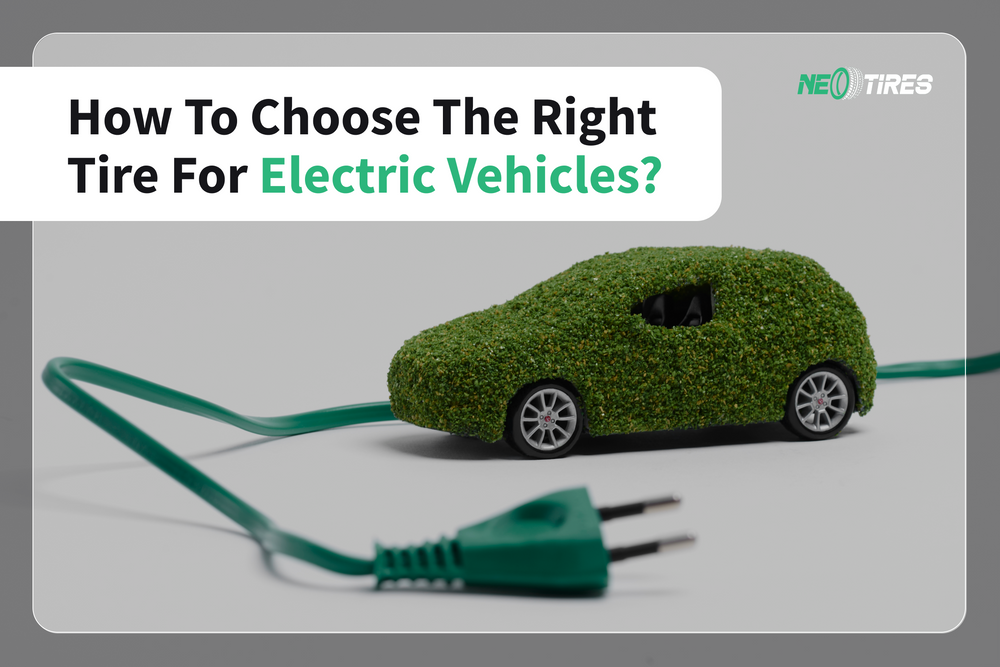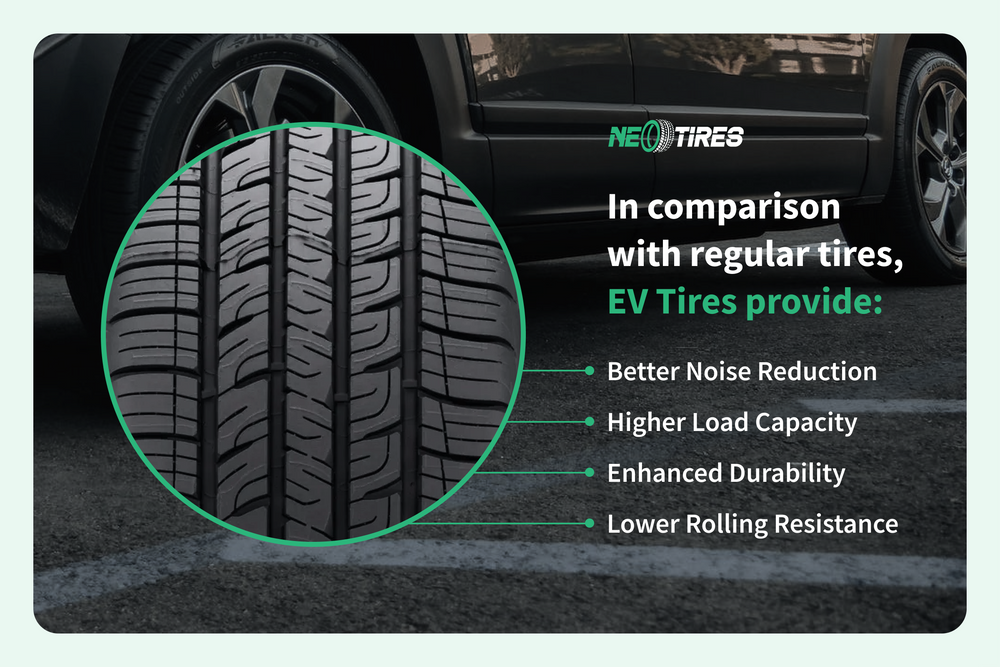EV tires are designed to match the heavier weight, instant torque, quiet operation, and low rolling resistance of electric vehicles, all in one. Choosing the best EV-compatible tires means balancing durability, maximizing range, and ensuring safety for the driver. While an electric vehicle (EV) can operate on regular tires as long as the right load rating is ensured, EV-specific tires address the unique needs of all electric cars, such as noise reduction, extra weight and torque stress, and low rolling resistance, rather than just meeting basic fitment standards.
This section examines what makes electric vehicle (EV) tires unique, what to look for when buying EV tires, and provides the best EV tires for your vehicle.
If you're still unsure whether you need a regular tire or an EV-centric tire for your electric car, check our video comparison: Do EVs Need Special Tires? EV vs Regular Tires | Video.
How To Choose The Right Tire For Electric Vehicles?
The key factors when buying tires for electric cars are low rolling resistance to maximize driving range, a proper load index to handle the vehicle’s extra weight, durability to ensure long tread life, and noise-reduction technology to preserve the quiet ride EVs are known for. Here is a breakdown of how these factors contribute to EV driving performance:
Low Rolling Resistance
Low rolling resistance (LRR) tires optimize the amount of energy an electric car uses while rolling on the road. An LRR tire can improve energy efficiency by up to 10%, according to the U.S. Department of Energy.
Using a regular tire on an electric vehicle (EV) can reduce the vehicle's range, resulting in lower mileage per full charge. EV-specific tires feature special designs and materials that optimize rolling resistance, allowing an EV to travel further on a single charge.
What To Look For
Look for labels featuring "LRR," “Elect”, "Energy Saver," or "Low Rolling Resistance" and tread designs featuring a more continuous pattern with reduced tread depth in LRR tires.
Ask the dealer to help you with LRR tires. NeoTires can help you find the best LLR tires compatible with your electric vehicle.
Tire Load Index
Electric cars (EVs) generally weigh about 10%-30% more than an internal combustion engine (ICE) car due to the heavier battery. The extra weight on tires contributes to faster rubber wear, especially in cornering, acceleration, and braking maneuvers. EV-specific tires typically require a higher load rating, which ensures resistance to additional load due to the tire's reinforced construction.
What To Look For
Check the manufacturer's guidelines in your vehicle's manual for the recommended load index and never downgrade it. EV cars are often compatible with tires that have higher load ratings than those for ICE cars, as well as tires with a similar load rating as those for ICE cars, provided that the tires are labeled as XL (extra load) or HL (high-load).
For example, a full-size Chevrolet Tahoe ICE SUV typically uses tires with a 103–108 load index, while an electric SUV like the Rivian R1S requires tires with a higher load index of 109–113. While the vehicle category remains the same, the added weight of the battery pack and the stronger torque delivery of the Rivian R1S necessitate reinforced tires.
Comparison of Tire Load Ratings between ICE vehicles vs Electric vehicles
| ICE Model & Load Index Range | EV Equivalent & Load Index Range |
Vehicle: Compact Sedan | Toyota Corolla: 92 SL | Tesla Model 3: 96-98 SL/XL |
| Honda Civic:91-95 SL | Nissan Leaf: 95 SL/XL |
| Nissan Sentra: 86-89 SL | Chevy Bolt: 89-94 SL/XL |
Vehicle: Midsize Sedan | Honda Accord: 91-94 SL | Hyundai Ioniq 6: 97-99 SL/XL |
| Toyota Camry: 94-95 SL | BMW i4: 94-104 XL |
| Honda CR-V: 95-102 SL | Ford Mustang Mach-E: 103-104 SL/XL |
Vehicle: Compact SUV | Toyota RAV4: 102 | Tesla Model Y: 104-109 SL/XL |
- | Mazda CX-5: 92-102 | Hyundai Ioniq 5: 101-105 SL/XL |
*The load ratings for the mentioned vehicles are approximate and may vary across vehicle make, year, and model. Always check the driver’s manual for accurate load rating recommendations.
Noise Suppression
EV-specific tires generally feature sound-dampening foam and specialized patterns that help reduce road noise and vibrations. While an EV can technically run on standard tires, road noise becomes more noticeable, which contradicts the concept of electric vehicles providing a smooth and silent ride.
What To Look For
Look for tires featuring sound-cancelling technologies, such as noise-muffling foam and sound absorbers. Consider tire treads with silent sidewall technologies (closed shoulder designs) that contribute to sound isolation. Some relevant examples include the Michelin Primacy MXM4, featuring Acoustic Technology, and the models from the Hankook iON EVO line.
Tire Durability
The tires of an electric vehicle often wear out 15%-20% faster than regular tires due to the instant torque and the extra mass of the battery. On average, EV tires serve between 20,000 and 40,000 miles before replacement, making tire durability a key consideration for EV drivers.
What To Look For
Select tires with a generous mileage warranty that falls within the EV range. For example, Turanza EV tires have a limited warranty of up to 50,000 miles. Tire durability also depends on your driving habits, which involve a responsible driving style like smooth braking, gentle acceleration, and careful cornering. Check out The Best EV Tires in 2025 to find durable, efficient, affordable, and reliable EV models.
EV Tires FAQ
What Tires Do Electric Cars Use?
Electric cars typically run on EV-specific tires that prioritize:
- The support of the heavy electric battery weight
- the extended range
- the road noise suppression
- The resistance to the electric vehicle's instant torque
Do Tires on Electric Vehicles Wear Out Faster?
Yes, EV tires often wear out faster than regular tires by 20% or more, due to the car's heavier battery and the instant torque it provides.
What Is The Lifespan Of EV Tires?
EV-specific tires often last 20,000 to 40,000 miles on average. Factors such as driving style, road conditions, and tire quality all impact EV tires' durability.
Do EVs Require Tire Rotation?
Yes, regular rotation every 5,000- 6,000 miles is essential for EV tires to wear evenly and extend tire service life. Consider rotating earlier, as high torque and extra battery weight can lead to earlier tire wear.
Ready To Choose Your Next EV Tire?
Key factors, such as tire rolling resistance, noise suppression, durability, and load rating, impact the EV’s range and performance. Modern regular tires are an option for electric cars, provided they meet load rating requirements, according to Consumer Reports. However, standard tires often feature 1-2 technologies in isolation, while EV-specific tires integrate all of them, meeting all EV demands simultaneously.
Need support in finding the best EV tires for your electric car? NeoTires can help you out. We specialize in all types of tires for passenger cars, EVs, CUVs, SUVs, trucks, and tractors, and can help you decide what fits your needs best.
✅ Call us for personalized support
✅Explore our tire catalog by vehicle type, brand, or tire size
Drive safe and choose your tires wisely.






